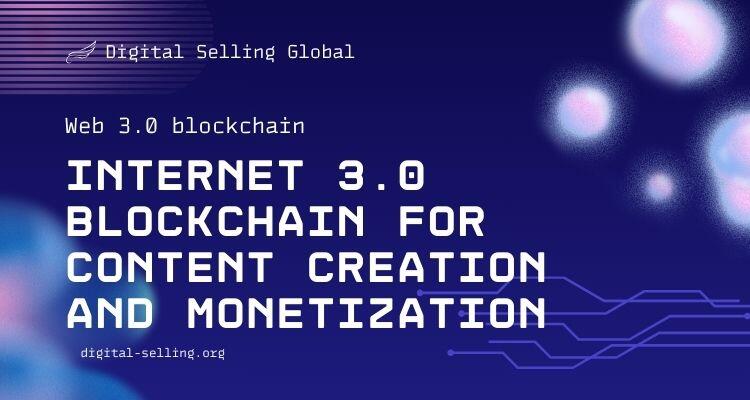Internet 3.0 blockchain is transforming how content creators earn and share their work to bring in a new era of creativity and monetization.
The Evolution of the Internet and the Rise of Internet 3.0 Blockchain
The internet has undergone significant transformations since its inception. From the static pages of Web 1.0 to the interactive and social Web 2.0, each iteration has brought new capabilities and opportunities. Now, we stand at the brink of a new evolution: Internet 3.0 blockchain. This latest phase leverages the power of blockchain technology to decentralize the web. Hence, offering unprecedented levels of security, transparency, and user control.
Understanding Internet 3.0 Blockchain
At its core, web 3.0 blockchain integrates blockchain technology into the very fabric of the internet. Unlike traditional centralized systems where data is stored and controlled by a single entity, blockchain operates on a decentralized network of nodes. Each node holds a copy of the entire blockchain, ensuring data integrity and resistance to tampering.
This decentralized approach has profound implications for content creation and distribution. In the context of Internet 3.0 blockchain, content creators can bypass traditional gatekeepers and directly engage with their audience. This model not only empowers creators but also ensures that they receive fair compensation for their work.
How Internet 3.0 Blockchain Benefits Content Creators
- Ownership and Control: One of the most significant advantages of Internet 3.0 blockchain for content creators is the ability to retain ownership as well as control over their work. In addition, blockchain technology ensures that creators can establish indisputable proof of ownership and track the distribution of their content.
- Monetization: Traditional content monetization models often involve intermediaries who take a substantial cut of the profits. With web 3.0 blockchain, creators can implement smart contracts to automate payments and ensure they receive a larger share of the revenue.
- Transparency and Trust: Blockchain’s immutable ledger provides complete transparency. So, creators and consumers can verify transactions, view the history of a piece of content, and ensure that royalties and payments are correctly distributed.
Examples of Internet 3.0 Blockchain in Action
Several platforms are pioneering the use of Internet 3.0 blockchain to revolutionize content creation and monetization. Here are three notable examples:
1. Dbuzz
Dbuzz is a decentralized social media platform built on blockchain technology. It allows users to post content, interact with others, and earn rewards in cryptocurrency. By leveraging the power of web 3.0 blockchain, Dbuzz ensures that content creators receive fair compensation for their contributions. The platform’s decentralized nature means that users retain ownership of their data and content, free from the control of centralized entities.
2. Peakd
Peakd is another innovative platform utilizing Internet 3.0 blockchain to empower content creators. It operates on the Hive blockchain and offers a wide range of features, including blogging, social networking, and community building. Peakd allows creators to earn Hive tokens for their content, providing a transparent and decentralized way to monetize their work. The platform’s emphasis on community and engagement makes it a powerful tool for building a loyal audience and generating revenue.
3. Liker Land
Liker Land is a blockchain-based platform that rewards content creators with Liker tokens. By incorporating web 3.0 blockchain, Liker Land ensures that creators are compensated fairly for their work and that their content is distributed transparently. The platform also promotes a culture of appreciation and support, encouraging users to engage with and reward their favorite creators.
The Future of Content Creation with Internet 3.0 Blockchain
As Internet 3.0 blockchain continues to evolve, it holds the potential to further disrupt and transform the content creation landscape. Here are some key trends to watch:
- Decentralized Autonomous Organizations (DAOs): DAOs are organizations governed by smart contracts on the blockchain. They can provide a new way for content creators to collaborate, fund projects, and share revenue in a transparent and decentralized manner.
- Non-Fungible Tokens (NFTs): NFTs represent unique digital assets on the blockchain. Content creators can use NFTs to tokenize their work, creating new revenue streams and engaging with their audience in innovative ways.
- Enhanced Security and Privacy: As concerns about data privacy and security grow, web 3.0 blockchain offers robust solutions. In addition, content creators can protect their work from piracy and unauthorized use, ensuring that their intellectual property is secure.
- Global Reach and Inclusivity: Internet 3.0 blockchain has the potential to democratize content creation by providing access to a global audience. Creators from all over the world can participate in this decentralized ecosystem, breaking down geographical and economic barriers.
Challenges and Considerations
While the promise of web 3.0 blockchain is compelling, several challenges remain:
- Scalability: Blockchain networks must scale to handle a growing number of transactions and users without compromising speed or efficiency.
- Regulation and Compliance: As blockchain technology disrupts traditional models, it must navigate complex regulatory landscapes to ensure compliance with laws and standards.
- User Adoption: For the web 3.0 blockchain to achieve its full potential, widespread adoption by both creators and consumers is essential. This requires education, awareness, and user-friendly interfaces.
Conclusion
Internet 3.0 blockchain is poised to revolutionize the content creation industry by offering unprecedented levels of ownership, transparency, and monetization opportunities. Platforms like Dbuzz, Peakd, and Liker Land are leading the way, demonstrating the transformative power of this technology. Finally, as we continue to explore and develop web 3.0 blockchain, the future of content creation looks bright, decentralized, and more equitable for creators worldwide.

